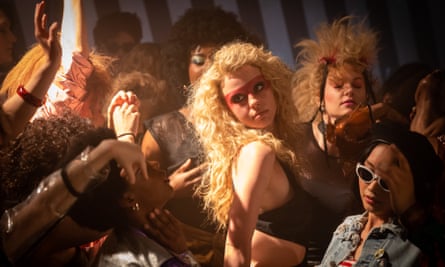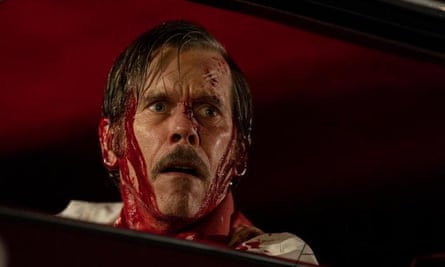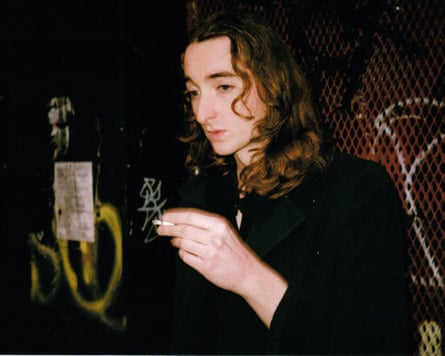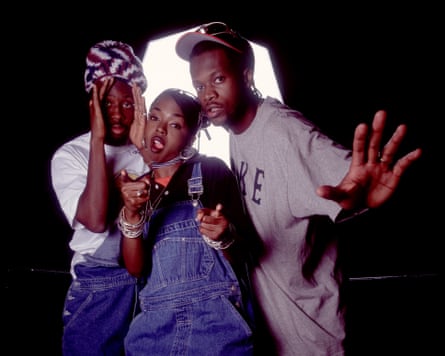MaXXXine, the latest high-sleaze shocker from horror auteur Ti West, opens with a montage of archival footage plunging us headfirst into the height of 80s satanic panic. West’s X trilogy, which MaXXXine concludes, is preoccupied by America’s never-ending conflict between old-school puritanism and the liberalisation of social norms, and MaXXXine makes the subject more explicit than ever. The film follows adult movie star antiheroine Maxine Minx (Mia Goth) trying to make the jump into Hollywood during the height of “moral majority” conservatism in the mid-80s, while being pursued by a serial killer.
Growing up in Delaware in the 80s, West remembers being perplexed by the censoriousness he would later go on to lampoon. “I remember older siblings who were into heavy metal music were looked down upon, like, ‘Are they actually evil people?’” he recalls. “I was like, ‘That’s my babysitter – if they’re evil, I’m screwed!’”
The X trilogy debuted in 2022 with X, about a group of amateur pornographers trying to make a film on a Texas ranch in the 70s, and became a sensation later that year with the release of its 1918-set prequel Pearl, about a murderous farm girl who dreams of being a star. Each film was made for $1m – microscopic, even for the famously cheap horror genre – and made more than 10 times that at the box office. West directed, produced, wrote and edited all three films; they are disturbing, lovingly made genre pastiches with style and humour lit up by Goth’s gonzo performances. In a five-star review of Pearl, the Guardian’s Peter Bradshaw described her as “the Judy Garland of horror”.

Goth manages to make Maxine and Pearl seem like pure-hearted strivers with an insatiable need to do whatever it takes to achieve stardom. (The most famous of the many Pearl memes is a TikTok comment reading, “Pearl is so kind.”) “I think everybody relates to wishing you had a life different to the one you have,” West says.
The X trilogy skirts the borders of what’s been termed “elevated horror”, a borderline-pejorative genre tag for films that eschew jump scares and gore in favour of atmosphere and sophisticated ideas. The term is broadly associated with A24, the cult distributor whose “smart” horror films such as Hereditary and Midsommar have become genre-transcending hits in recent years. Though A24 also releases the X films, West’s series features enough sleaze and violence to satisfy old-school fans of the genre. If flying body parts aren’t your thing, best steer clear of MaXXXine.
West says he feels “the labelling is silly” because so much classic horror plays on the psychological fears that supposed “elevated horror” also does, but he understands the use of the term. “I think it served its purpose for a time, [but] when you hear it now I feel like it’s become a collective eyeroll for everybody,” he says. He adds that some horror films “are just an obstacle course of jump scares, basically, so they get considered as non-elevated because they’re just meant to be an activity for the audience. But it’s not as if all of those movies are completely vapid.”

One of the most remarkable things about MaXXXine is the way in which West gets prestigious actors – Bobby Cannavale as a buffoonish cop and wannabe actor; Elizabeth Debicki as a horror director trying to make a “B-film with A-ideas” – to meet the film on its gutsy, sordid level. Best of all is Kevin Bacon as a twisted southern private detective with gold teeth who chases Maxine through disreputable nightclubs and Hollywood backlots – one set piece takes place on the Universal lot in front of Psycho’s Bates Motel. West says Bacon was “ready” to get a bit deranged. “I think he was itching to do something like this, and it’s why he was the obvious choice for the role. I think he saw this as a chance to do a type of acting that he really wanted to be doing.”
MaXXXine is essentially a movie about making movies, something West clearly adores. Even though the film exposes the bloodthirsty drive for stardom that Hollywood can incite, it doesn’t depict the film business as being inherently corrupting. “I feel like a realist about Hollywood,” he says. “To be cynical about it is to some degree fair, but I don’t think it’s useful. Show business is an impersonal and relatively savage business, and it’s always evolving. If you’re lucky enough to have a day when you’re lauded for something, you have to enjoy it while it’s there.”
Much like his characters, he’s still seduced by the potency of Tinseltown’s promise. “Hollywood is one of those places where people feel like you could go there and be discovered at any moment and change your life,” West says. “That’s untrue for 99.9% of them – but for 0.1% of people it has happened, so it keeps the dream alive. There’s something kind of magical about that.”
Source: theguardian.com





















